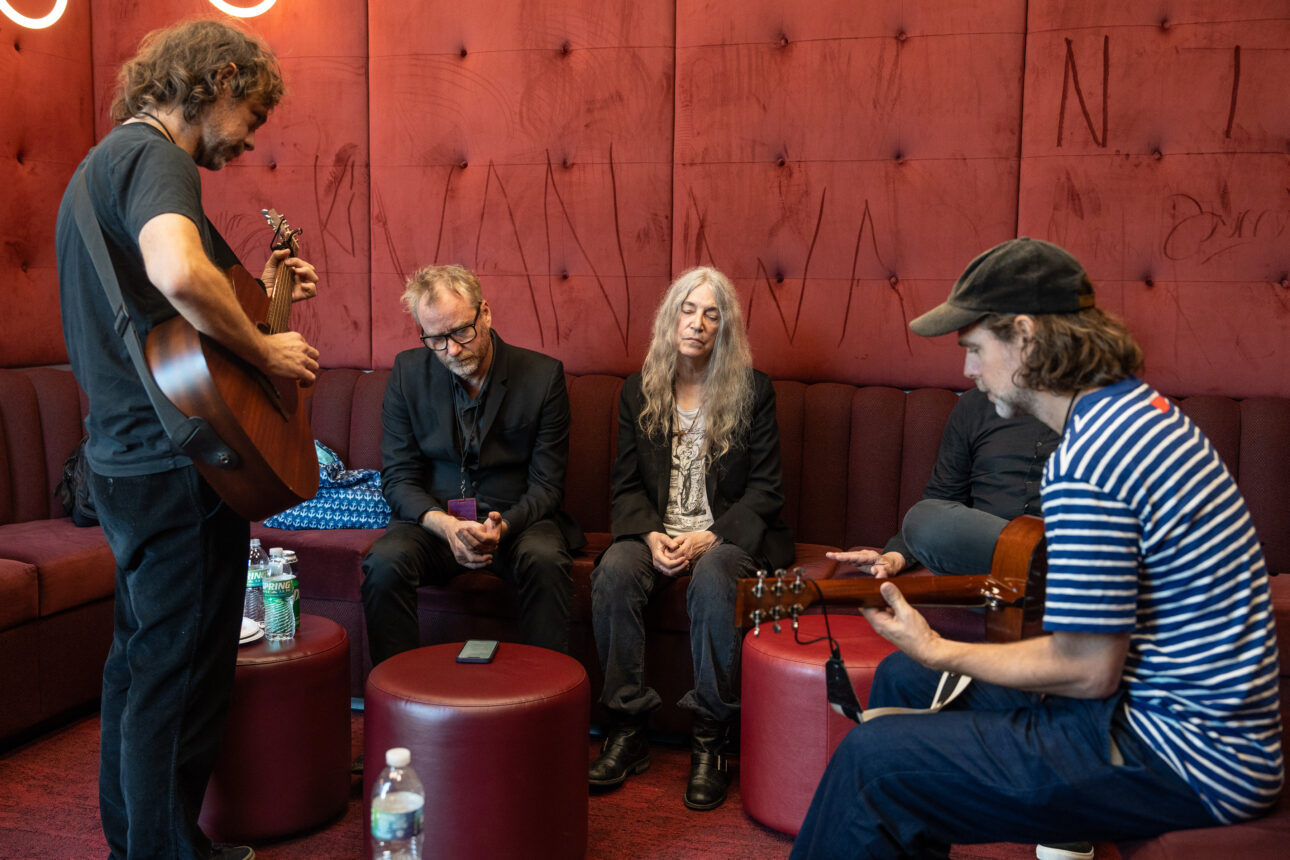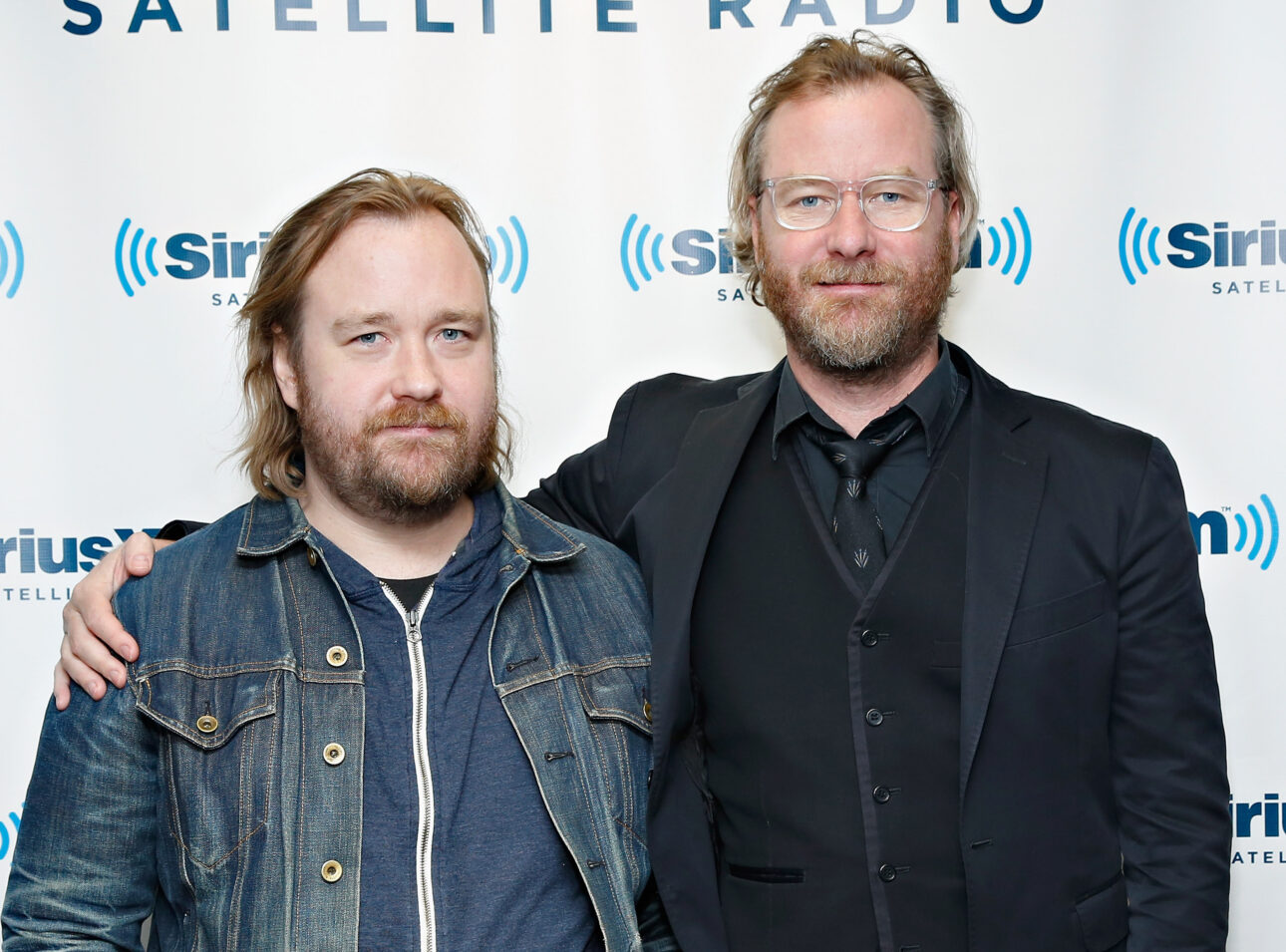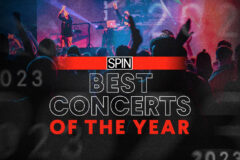Considering the depths of his pandemic-era depression and crippling writer’s block, the National‘s Matt Berninger is somewhat incredulous at all the magic he and his bandmates managed to conjure in 2023. The Cincinnati-reared quintet released two albums (First Two Pages of Frankenstein and Laugh Track) five months apart, sold out their first headlining show at New York City’s Madison Square Garden and welcomed the likes of Patti Smith and Pavement to their hometown Homecoming festival in September.
All of this took place against the backdrop of group member Aaron Dessner‘s increasingly high-profile writing and production work with Taylor Swift, who returned the favor by duetting with Berninger on the Frankenstein track “The Alcott.” Berninger also spoke openly about his mental health struggles in a recent sit-down conversation with David Letterman and returned to work on a semi-fictional TV show concept about his life in the industry, in which he hopes to star with his brother Tom.
Berninger, 52, rang up SPIN to discuss the genesis of Frankenstein and Laugh Track, the pros and cons of performing in Cincinnati, collaborating with Swift and some of his favorite non-National music of the calendar year.
SPIN: Did the band really not have a plan to do two distinct albums this year? Was Laugh Track truly a happy accident?
Matt Berninger: When we were getting close on First Two Pages of Frankenstein, there were a whole lot of other things that I hadn’t finished or hadn’t done a whole lot to. We put out Frankenstein and hit the road, and we were tinkering with and trying to finish the rest in hotel rooms or at soundchecks. Laugh Track felt like a continuation of Frankenstein. We didn’t start fresh — we just finished the rest of those songs from that whole period.
The reason we had so much built up was because I didn’t write anything for a long time during the middle of the pandemic. I mean, I guess I had been texting myself more than I thought, but the guys in the band had sent me so much music over that long period where I was not doing anything. Finally, the writing came back and I was writing and writing and writing fast. Once I was able to get back into it and finish songs and write again, I just didn’t want to stop, maybe for fear that it would go away again. Both these records were a very fertile stretch of feverish writing after two years of not being able to do anything at all. It was like, if we’re cooking, let’s not stop now.
Let’s say there’s an imaginary National fan who was on a desert island in 2023. If you had to describe to them the differences and similarities between the albums, how would you?
They’re connected, but what’s different about the two is that on the second one, you can tell that it’s a band that’s not stuck in the studio. Well, not stuck. We were embracing that intimate headphones/studio/laboratory sort of chemistry. Throughout the two records, you hear what it sounds like when a band that’s had headphones on for two-and-a-half years starts to play live again, and how that changes things. On Laugh Track, you can hear the sound of a live band crackling back together, more than on the first record. Not only am I hearing my own taking apart the cadaver of my mind — a full autopsy of my mental state over that two- or three-year phase — but also the chemistry of the band rekindling and finding itself. For me, it feels like a double album. That’s why I wanted to have the same cover, because these records are different versions of the same idea in many ways, at least in terms of what I was writing about. When I see these on a shelf, I want them to be linked forever.
Is there any cognitive dissonance in the experience of having Taylor Swift sing a song with the National that you ostensibly wrote about your wife Carin?
No. I’ve been writing characters from the beginning and long since I met my wife. She’s name-checked directly and indirectly on a lot of songs. Almost everything I’ve written in the 18, 19 years since we met has gone through her filter. She’s truly a brilliant editor. She listens to everything I do and not only gives me feedback but also sometimes gives me lines when I’m missing things. When Taylor came in, it was really easy for her to get into that character of a writer. The lyrics I had written talk about somebody writing in a corner with a golden notebook. Taylor wrote everything she sang. This is the only example, really, of a song of ours where someone other than my wife wrote a significant amount of the lyrics. That song is about the idea of having a partner who you love but is also a creative inspiration and collaborator. It didn’t feel weird, because there have been a lot of singers who have sang lyrics I’ve written about my wife or lyrics that I are things my wife would say [laughs]. I’m used to it now, and so is Carin. When we hear people like Phoebe Bridgers or Taylor or Lisa Hannigan or Sufjan Stevens sing songs we’ve written, it’s such a thrill.
If my memory serves, didn’t Taylor meet the band for the first time after a Prospect Park show back in 2019?
I’d met Taylor a couple of years before that. She invited me to a really small performance where she just played piano for a room of people for about 45 minutes. We’d all been communicating. We knew she was a fan and we’d heard that she knew all our songs. I think she met Aaron for the first time at that Prospect Park show, but I barely remember it because there’s always so much chaos when we play in New York. We also had the Brooklyn Children’s Choir with us that night, and people were out of their minds excited knowing she was there watching the show. I don’t think Aaron realized just how much of a cultural force that Taylor’s world is. It’s enlightening! Coming from the indie rock world, you don’t imagine that level of exposure, but I think Aaron’s handled it gracefully.
Is there already any new National music percolating?
We’re in a great phase. We’re trying to play songs we haven’t played in a long time, so we use our whole two-hour soundcheck. Usually, we’re always cooking up something new almost every day on tour. We’re just going to start collecting lots of music. I want to continue to always be writing, but I don’t think there’s anything on the immediate horizon right now. We’re exploring, jamming and having a lot of fun. After such a long period of not being in the same room, now we’re like, let’s fuck around. I suppose you could call that writing [laughs].
I imagine being able to host a festival like Homecoming in Cincinnati is a really special thing, but do people still come out to the woodwork? For example, is your seventh grade biology teacher just now discovering that the National is famous?
It’s really beautiful. I used to see shows at Bogart’s and other places, but Cincinnati was never a cornerstone for touring bands. I think the most satisfying thing is that I get to watch my aunts, uncles and little cousins and nephews rocking out to Pavement and Patti Smith, who probably wouldn’t come through Cincinnati otherwise. There’s also something a little bit embarrassing about it. Even the best shows, I walk off feeling a mixture of accomplishment and humiliation. It’s a bit of a silly thing to stand up and sing love songs you wrote to thousands of people. I’m not an extrovert so much in that sense. I was never a performer. I never did school plays or anything like that. If you’d ask my graduating class of all men at St. Xavier High School who would be most likely to be a stage performer, I would not have been anywhere near that list. People go, where did that guy come from? I do too. Even I’m not sure.

Have you come to know or understand things about David Letterman that might surprise the average viewer?
The interview we did shows a fairly different side to him. If you’d only ever watched his TV show, you’d be like, wow, there’s a lot more going on here. We performed on his show many times and met him there, but you keep it to a quick hello because everyone is in show mode. Dave later came to one our shows, and right away he wanted to get under the surface and talk about lyrics, and specifically about depression. He was so generous in talking about things in his own life. But this was right before we went onstage, and I remember thinking, ‘God, I would really like to talk to him more.’ When Laugh Track was finished, I said, if I’m going to do any interviews, I wonder if I could just talk to Dave? I called him and he couldn’t have been more delighted to do it. He came over and we talked for a couple of hours. I didn’t know if I wanted to film it, but I’m glad I did. We talked about so much stuff, like the difference between indie rock now and before and him growing up in Indianapolis and me just a couple hours away in Cincinnati.
We talked about depression, and it was so great to compare notes with someone who has the perspective based on where he is in his life. I was able to glean more from him than all the time I was talking to therapists, even though we were both just kind of telling each other what our therapist had said half the time [laughs]. I’m so grateful for him for being so genuine. And now, if something like that tough period I had during the pandemic comes back again, he’s on the list of people I can call to talk. There are times when grabbing your bootstraps and yanking on them doesn’t do anything, you know? What was important about that conversation is us both acknowledging that sometimes it gets worse than you realize, and sometimes you need help to get out of it.
Speaking of TV, is it true that your TV show concept has come back to life? I remember you filming scenes for it several years ago backstage at the Eaux Claires festival.
Oh my gosh. You were there for that [laughs]? One of the things that triggered my depression was having to put that TV show down and having to realize that maybe it wasn’t going to happen. When some people reached out to us about it again, I was like, I don’t know. Maybe I shouldn’t? But I can’t resist. Even Dave was like, you’re in the National. Why would you want to make a TV show? From his perspective, getting out of TV was in some ways really healthy for him. And that’s from someone who has produced TV shows like Everybody Loves Raymond. I said, ‘I think I just want to see my brother Tom on TV [laughs].’ That’s the biggest reason. I also don’t think there have been very many good shows about music. I’m calling it Das Apes, which is a wink at The Monkees, which I was in love with as a kid. So, it is alive. I don’t know if we’ll be able to pull it off, but I sure hope so.
I was going to say, it’s not enough for Mistaken for Strangers to be Tom’s only star vehicle.
Anybody who has seen that knows he’s 100% on the surface all the time. Guileless is the most common word used to describe him. He’s a complicated, wonderful person. This would be a totally scripted show. It’s not going to be a fake doc or have that wink-at-the-camera vibe at all. It’s not going to be written just by me, by any means. I’ve been tapping all my people who have had all kinds of different experiences, and not just in the music industry. Sometimes your longstanding projects that go nowhere can still be the most satisfying.

Has any music this year felt really important or satisfying to you?
I’m not saying this just because Sufjan’s a pal, but Javelin is a really powerful, beautiful, healing record. When Trump won, [Stevens’ 2015 album] Carrie & Lowell was the only thing I could listen to. This record has that same power for me. The Billy Woods/Kenny Segal record is incredible. I love all the food references — the skate wing with butter and capers. Then he makes a joke about $400 Japanese jeans from Blue & Cream, of which I own a pair [laughs]. The writing is unbelievable. I’m obviously a huge boygenius fan. What can you say? All three of those women are in constant rotation in my car and house. It’s inspiring on all kinds of levels.
This loose but connected group of people, like the National, Taylor, Phoebe and Jack Antonoff, really seem to have reached a new peak in terms of collaboration and creativity.
I agree. We’ve always enjoyed bringing other people into the studio with us. Even with the TV show, the Walkmen guys have been a really big part of that. It feels like this spiderweb of artists who are fans of each other and love to pick up the phone and ask, hey, want to do this? Rosanne Cash is somebody I never expected to have a relationship with. I reached out to her way before the pandemic. When I was in my deepest depression, I talked to her not just about music but also about how to be a parent and a son. Then you throw David Letterman into that mix and sometimes I don’t know how I got so lucky to be able to connect with all these brilliant artists and thinkers.
"Exit" - Google News
December 28, 2023 at 09:30PM
https://ift.tt/WrLIg85
Exit Interview: The National's Matt Berninger On Double Albums, Cincinnati And David Letterman - Spin
"Exit" - Google News
https://ift.tt/vJnGXgC
https://ift.tt/68NHubZ
Bagikan Berita Ini















0 Response to "Exit Interview: The National's Matt Berninger On Double Albums, Cincinnati And David Letterman - Spin"
Post a Comment